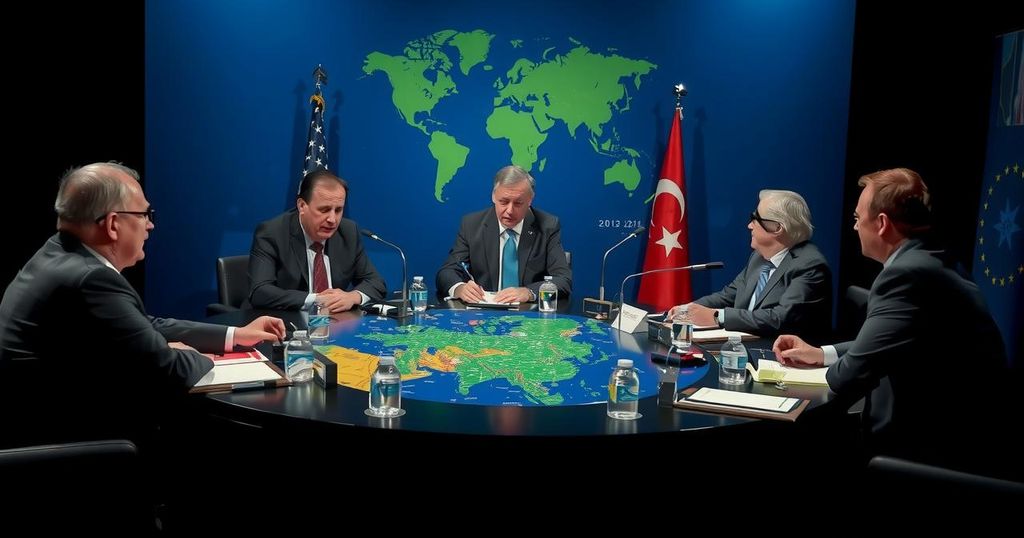UN Urges G20 to Prioritize Climate Finance Amidst Economic Threats

The UN has issued a stark warning to G20 leaders in Rio de Janeiro, urging them to secure financial agreements for poorer nations to combat climate change, highlighting the severe economic repercussions of inaction. Discussions also focus on debt relief and the necessity of rapid emission reductions to mitigate climate-driven economic crises.
In a harsh warning, the United Nations has urged G20 leaders convening in Rio de Janeiro to prioritize climate financing for the world’s poorest nations amidst an escalating climate crisis. The discussions, taking place over two days, come as negotiations at the Cop29 climate summit in Azerbaijan face significant hurdles, particularly regarding the necessary financial support to help developing countries mitigate greenhouse gas emissions and adapt to climate impacts. Simon Stiell, the UN’s climate chief, emphasized the necessity for G20 nations to cooperate, stating that the global climate crisis should be their foremost concern. He underscored that climate-related disasters are already devastating the economies of G20 member states, affecting supply chains and increasing inflation rates. Stiell advocates for immediate and decisive action to avert economic disaster, noting, “Without rapid cuts in emissions, no G20 economy will be spared from climate-driven economic carnage.” Additionally, Stiell highlighted the pressing need for debt relief for many poorer nations, which are currently burdened by heightened debt servicing costs, inhibiting their climate adaptation efforts. As international cooperation becomes increasingly urgent, he remarked, “In turbulent times and a fracturing world, G20 leaders must signal loud and clear that international cooperation is still the best and only chance humanity has to survive global heating.” Discussions in Rio will also address the urgent financial demands set forth by developing nations, which are seeking $1 trillion annually by 2030 to meet the Paris climate agreement stipulations. Research indicates that these countries require approximately $2.4 trillion per year, primarily from domestic sources, with $1 trillion needed from external financing, half of which should originate from private sector contributions. The ongoing negotiation complications at the Cop29 summit reflect the pressures and expectations surrounding this funding. Concerns are mounting over the suitability of host countries for such significant climate discussions, especially given Azerbaijan’s reliance on fossil fuels, which represent 90% of its exports. This trend of petrostate leadership in climate negotiations, including the UAE’s hosting last year, raises questions regarding commitment to genuine climate action. Future Cop summits will need to establish safeguards that ensure venues are conducive to proactive climate policies. As the G20 leaders prepare to meet, vital prospects for climate finance and emissions reduction are on the agenda. President Lula da Silva of Brazil is anticipated to advocate for stricter emissions targets alongside financial commitments during the discussions. The UK has already pledged an 81% carbon reduction target by 2035, reflecting a wider call for enhanced climate initiatives among G20 nations. As the Cop29 event progresses, there remains cautious optimism among delegates regarding the pace of discussions and their eventual outcomes.
The G20 gathering serves as a critical platform for the leaders of the world’s major economies to discuss pressing global issues, including climate finance and the climate crisis. As the world grapples with significant environmental challenges, this assembly of economic powerhouses is crucial for coordinating a unified response to climate change. The ongoing negotiations at the Cop29 summit further compound the urgency, as developing nations seek substantial financial commitments to address their climate vulnerabilities.
In conclusion, the G20 summit in Rio de Janeiro represents a pivotal opportunity for global economic leaders to address and resolve pressing climate finance issues. The UN’s strong admonition highlights the time-sensitive nature of cooperation to avert disastrous economic outcomes driven by climate inaction. As the potential for bolstering climate initiatives unfolds, the responses from G20 nations will play a crucial role in shaping the future of global climate governance and equity.
Original Source: www.theguardian.com






